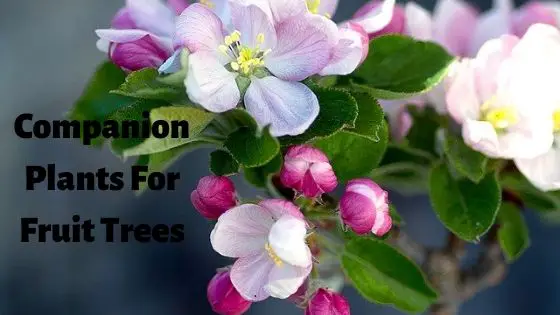In traditional orchards, fruit trees were grown in rows but as stand alone plants and relied on each others blooms to attract pollinators. As amatuer gardeners, we need all the help we can to get things pollinated. So here is a list of useful companion plants for fruit trees.
Companion Plants For Fruit Trees
The idea of companion planting is not a new concept, in fact there are records dating back 10,000 years of companion planting practises. It’s basically the principle of growing plants close together for the health and improvement of one or more of the plants. Many of the following plants can be used for more than one tree type.
Fruit Tree Companion Plants
Let’s start with the best plants to use as companion plants for fruit trees and the reasons why.
Comfrey
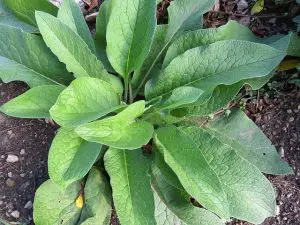
This useful herb should be grown in every garden, it grows vigorously, blocking weed growth and the roots stretch deep into the sub soil. Because of how deep the roots penetrate, comfrey releases minerals and nutrients not available to other plants. Comfrey can also be cut up to 4 times each season and used as plant food.
To find out more about how to make comfrey tea and it’s many uses follow this link.
The flowers attract pollinators, so planting comfrey around your fruit trees is a win-win. Comfrey is said to improve the soil just by growing! For more information on companion planting comfrey follow this link.
Dandelions
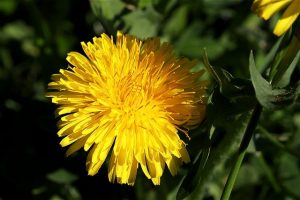
I know many gardeners consider the dandelion to be a pesty weed, but dandelions are really useful plants to grow. Another plant with a deep ground penetrating tap root, the dandelion releases deep minerals and nutrients not available to many plants. Each dandelion head is comprised of 100s of individual flowers all containing nectar for insects.
As dandelions are one of the first flowers to bloom, they are handy for attracting early pollinators to your plums, peaches, apricots, cherries and early flowering apple and pear trees. The one downside is dandelions release ethylene gas which causes fruit to ripen quickly.
Not necessarily a problem but could be problematic if all the fruit ripens at once. To find out more about companion planting dandelions click here.
Marigolds
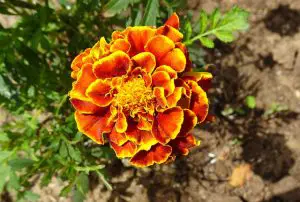
These attractive flowers are great for attracting pollinators and also for repelling nematodes. Nematodes live under the soil and damage plant roots to the point of death of the plant. The aroma exuded from marigolds keeps these pests away giving your fruit trees a much better survival rate.
Marigolds also encourage the growth of beneficial mycorrhizal fungi, for more on mycorrhzal fungi follow this link. As long as marigolds are regularly deadheaded, they will bloom all Summer long. If allowed to set seed they will regrow next season, for more on marigold companion planting click here.
Nasturtiums
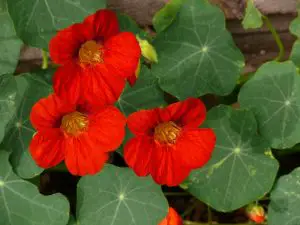
By growing nasturtiums around your fruit trees you will deter many pests, nasturtiums secrete a chemical into the soil that is taken up by the trees. This chemical makes the trees emit the same fragrance as nasturtiums and this keeps the pests away.
It works best if nasturtiums are regrown under fruit trees year on year. Nasturtiums are particularly good at deterring codling moths that affect both apple and pear trees. For more on companion planting nasturtiums follow this link.
Lavender
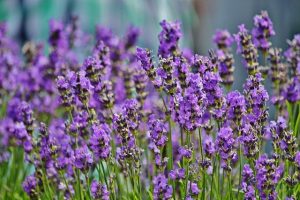
This aromatic low growing plant makes a great companion plant for fruit trees. Not only does lavender repel many pests, it also attracts great pollinators like bees and hoverflies. Hoverfly larvae also feed on aphids, so growing lavender gives an added bonus.
Particularly good for apple and pear trees, lavender repels codling moths. To find out more about companion planting lavender click here.
Chives
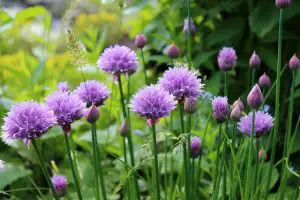
Like other members of the allium family, chives will deter many pests including aphids. Chives also attract many good pollinators once in flower and they take hardly any maintenance at all.
Dill
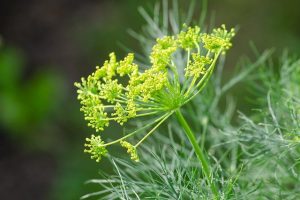
This herb related to carrots, attracts parasitic wasps that will keep pest populations down. Dill also repels cabbage white butterflies, and will regrow every year if allowed to set seed.
Rosemary
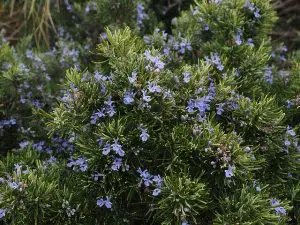
Another aromatic herb, rosemary is a must for the organic gardener. It repels many pests including aphids and mosquitoes. As rosemary flowers early in the season it will attract many pollinators.
To find out more about companion planting rosemary follow this link.
Stinging Nettles
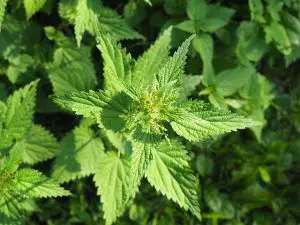
I know you’re probably thinking I’ve lost the plot, first dandelions and now stinging nettles, but please read on. Stinging nettles make great companion plants for fruit trees because they attract beneficial insects. Insects like ladybirds(bugs), bees, and butterflies.
Stinging nettles are a rich source of magnesium, iron, calcium, and silica, and any plant growing in companion to them will benefit. The main benefits include resistance to aphid attack and resistance to mildew, making the plants stronger and healthier. For more on companion planting nettles click here.
Companion Plants For Fruit Trees-Flowers
There are many flowers that are beneficial companions for fruit trees and most can be found in my post flowers that repel pests(15 top plants to repel pests) . Sorry for the blatant plug but it’s easier than writing them all out again.
Similarly there are many herbs that make great companion plants for fruit trees and many can be found in my post herbs as companion plants.
I also have a few posts on companion planting fruit trees, this is not inclusive but does cover some of the more common fruit trees. These include,
- companion planting apple trees
- Also companion planting peach trees
- Along with companion planting pear trees
- Plus companion plants for cherry trees
- As well as companion planting plum trees
- And companion planting apricots
Another quite interesting tree is the black walnut tree, there have been many reports on how toxic to other plants this is. It all goes back to Pliny the Elder 2000 years ago, but not all plants are susceptible to juglone. Which is the compound exuded by the black walnut which gives it it’s allelopathic capabilities.
For more on the black walnut tree, or what not to grow with walnut trees follow this link.
Good Companion Plants For Fruit Trees
In most cases the very best companion plant for fruit trees, are other fruit trees of the same species. There are also new discoveries being made every day, so experiment, try a few and see what happens. Let me know in the comments of your successes and failures.
I’ve added a few slightly contraversial plants in as companion plants. I’m talking about dandelions and stinging nettles, both considered weeds. I find them to be beneficial and extremely easy to grow.
They also attract many various forms of interesting wildlife, handy if you want to interest children. My grandchildren all enjoy gardening and this springs from me getting them involved early by watching insects. Now we have them growing tomatoes, potatoes, and cress, all useful skills to learn.

